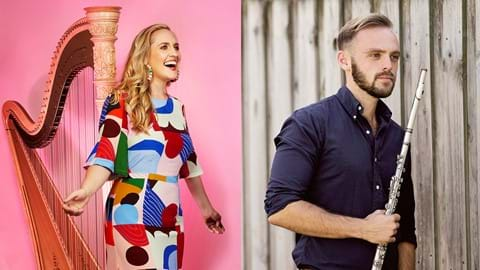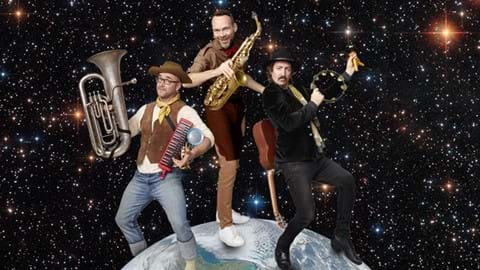Q & A WITH Joshua Batty & Emily Granger
Byline: Sean Moloney
Performing in the Sydney Morning Masters series in 2021, is the duo of Sydney Symphony Orchestra Principal Flute Joshua Batty, together with the acclaimed harpist Emily Granger. They’ll be taking to the stage on 24 March 2021 to perform a program of music they’ve carefully curated with music included by Astor Piazzolla, William Alwyn and the Australian composer, Anne Boyd.
In 2020, we asked the pair to sit down and tell us a little bit more about their lives, why the combination of the flute and harp together is so special, and the repertoire they’ve chosen for their upcoming performance. To purchase tickets, visit musicaviva.com.au/batty-granger.
We started off by finding out a little more about the books they are currently reading, and what their most memorable book was:
Emily: I’m currently reading the Grapes of Wrath by John Steinbeck. My most memorable would have to be Wild by Cheryl Strayed because that inspired me to go on my 3,000 kilometre walk across New Zealand.
Joshua: I’m reading two pretty contrasting books at the moment. One is a book on psychology in which I am becoming quite interested as a hobby, and one is a reread of Harry Potter for nostalgia! I guess since Emily mentioned Steinbeck, I’ll say Of Mice and Men as my most memorable.
Followed by what we would find if they opened a music streaming service on their phones:
Emily: Dirty Projectors and Chance the Rapper.
Joshua: If it’s classical, recently quite a lot of Jacqueline du Pré.
And finally, where we would find both artists on a Sunday afternoon if they’re not rehearsing or performing.
Joshua: My partner and I have recently been fortunate enough to move to Manly, so I guess at the beach or with friends.
Emily: I would be out for a walk along the Cooks River, behind my house in Tempe.
Both Emily and Joshua discovered their respective instruments in different ways:
Emily: It was the sound of the harp that drew me to the instrument. I heard it on a CD of Irish Celtic music and remember sitting in the living room putting this CD on and hearing the harp for the very first time. I had to pick an instrument to pursue in 7th grade (either band or orchestra) and asked my mum if I could play the harp in the orchestra, and kept asking until she finally gave in and took me to my first lesson! I had no idea what I was getting myself into and that was probably a good thing! I showed up on the first day of orchestra with a harp, and they had no idea what to do with me! But anyway, I persevered and here we are nearly 20 years later.
Joshua: I originally started on the clarinet. I had a lot of pulmonary issues as a child and was advised by a schoolteacher that a wind instrument would be a medical way of strengthening, which was absolutely true. I later heard the sound of the flute and remember hearing an inspiring liveliness in the sound - a free-spiritedness. Then, like a lot of people, we were surrounded by James Galway’s recordings growing up and everything else ensued. I transferred from the clarinet to the flute because they are such contrasting embouchures; I couldn’t therefore continue on both.
Emily and Joshua gave two complementary answers as to why the ensemble combination of flute and harp has persisted for hundreds of years, and why the two instruments are well balanced:
Emily: It’s that the combination of instruments are just so well suited to each other, and as a harpist, it’s quite nice to work with a wind instrument. To be able to create music through breath and to be able to sustain, and to have such a different tonal colour than the harp. It’s just such a beautiful sonic combination.
Joshua: Ultimately both instruments have developed so much; the flute has developed to be a more powerful and arguably flexible instrument than it was hundreds of years ago. The original purpose was and still can be a sense of beauty, and that gels so harmoniously with the harp, being the instrument of the pearly gates and all! I think what Emily said is exactly that – the sustained and the melodic qualities. Also, in a really technical sense, the flute is similar to the harp in that it has a brightness to the sound, obviously being a treble instrument, but it also has a lot of bloom. The harp has all of the percussive elements, but then it has this amazing reverberation also - I think that’s why they work so well together.
Joshua and Emily have both performed as part of flute and harp ensembles and recalled some of their previous memorable collaborations in this format.
Joshua: The flute and harp cocktail is relatively new for me! I have mostly collaborated in other chamber formations, with piano or in the orchestra, but before I left the UK I did get to perform and tour with Elen Hydref, a brilliant Welsh harpist. We spent two or three years together while we were at college as part of a duo where we performed throughout the UK; this was where I was introduced to most of the main repertoire for the ensemble. Also, when I joined the RTE Concert Orchestra, my first concert was the Mozart flute and harp concerto with Geraldine O'Doherty, a fantastic harpist and friend. That was a real treat for me.
Emily: I’ve been so fortunate to have worked with many incredible flute players over the years including Sally Walker and Jonathan Henderson here in Australia. My longest harp and flute collaboration has been with the Chicago Symphony Orchestra flautist, Emma Gerstein, for nearly a decade. We met while studying at Indiana University and moved to Chicago around the same time. A few years back we toured Australia and New Zealand, but our most memorable performance was playing a recital at Weill Recital Hall at Carnegie Hall.
Emily and Joshua met while performing in the Sydney Symphony Orchestra.
Emily: It was last year [2019] on the regional tour with Sydney Symphony Orchestra. I was hired as guest principal harp for the tour and we were touring the suite from Carmen by Bizet. The Intermezzo opens with just the harp and flute. We got to perform it numerous times in concert and also for the kids at the education concerts, so we really got to play around with our interpretation of each performance. Umberto [Clerici] was conducting and gave us free rein to do whatever we wanted, so that was really how we met and got to know each other musically. We’ve never played chamber music together, so this will be our first time - our debut!
When discussing the upcoming Sydney Morning Masters performance, Joshua offered this insight to how the concert was programmed:
Joshua: My aim was to approach the programming with a sense of balance for both Emily and I as well as the audience, trying to incorporate some early music, which is naturally going to be an arrangement whilst incorporating some of my favourite “meatier” pieces for the ensemble. I wanted to incorporate the other facets of the flute and harp to those of quintessential beauty which we have come to expect. For this reason, I decided to programme the Naiades by William Alwyn, because it’s such a dramatic and stormy piece. I wanted to vary the mood as much as possible between pieces to keep the variety and interest for the audience. I then decided to programme the Goldfish Through Summer Rain by Australian composer Anne Boyd, which is a short piece full of colour which I hadn’t heard until moving to Australia.
Both performers have a personal highlight of the program however,
Joshua: I love the Alwyn. I think it’s a great, wholistic piece
Emily: I’d have to say the Piazzolla.
Joshua: Plus you get to tap the harp!
Emily: Yeah, exactly!
And finally, when asked what audiences can expect from their Sydney Morning Masters performance,
Joshua: Fun! We have a laugh together as people, every time I’ve had the privilege of playing or socialising with Emily, it has been great fun. I hope that comes across. Also, hopefully after this crazy year that we have all experienced, we hope it will be a little bit of escapism for the audience into a completely different and enjoyable world.
Joshua Batty and Emily Granger will be performing on 24 March for Sydney Morning Masters. Tickets available now.


